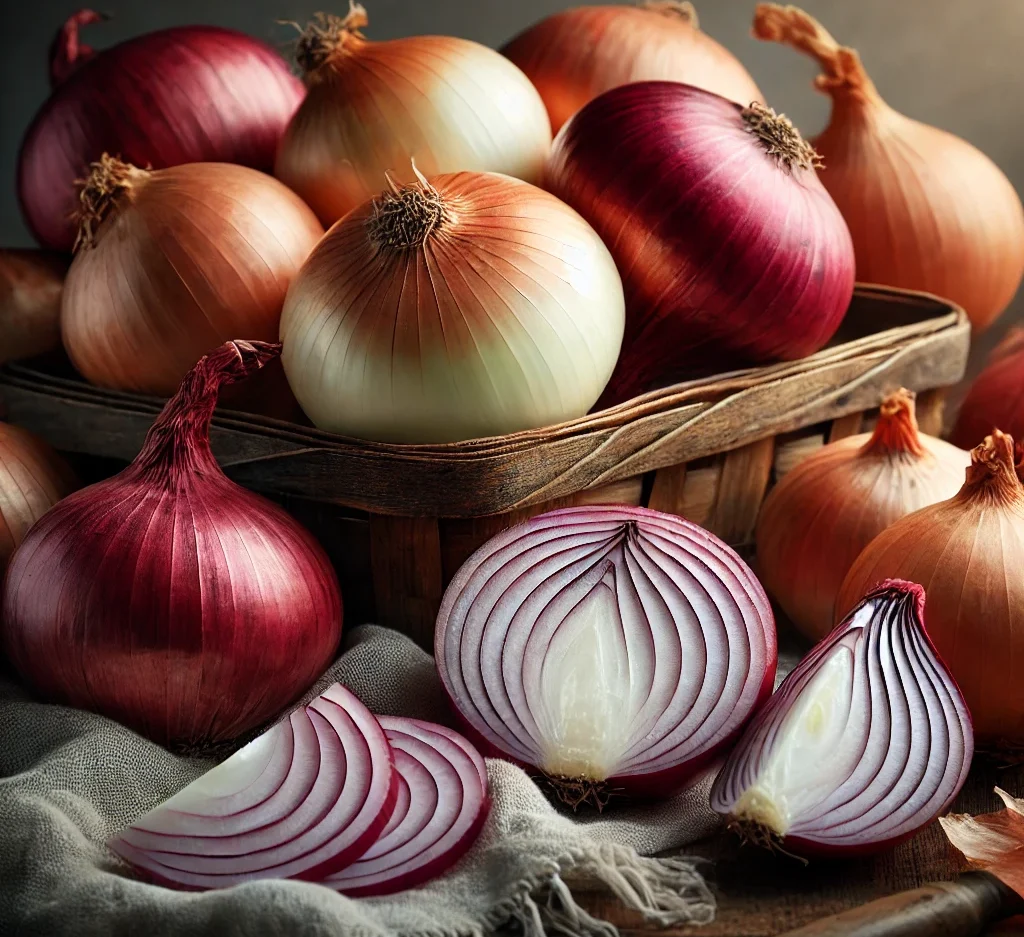Onions, a staple in kitchens around the world, are much more than just a flavorful base for many dishes. Packed with essential nutrients, antioxidants, and sulfur compounds, onions offer a wide range of health benefits. From supporting heart health to boosting the immune system, onions are a powerhouse of nutrition. Available in various types, such as yellow, red, white, and green, onions are rich in vitamins, minerals, and antioxidants. They have been used for centuries for their medicinal properties and remain a valuable addition to healthy eating.
Health Benefits of Onions
Rich in Antioxidants: Purple onions are packed with antioxidants, including quercetin, which help fight oxidative stress, reduce inflammation, and may lower the risk of chronic diseases like heart disease and cancer.
Good for Heart Health: They contain compounds like sulfur and flavonoids that can help lower cholesterol levels, improve blood circulation, and support overall cardiovascular health.
Boosts Immune System: The high vitamin C content in purple onions helps strengthen the immune system, promoting faster recovery from illness and supporting skin health.
Anti-Inflammatory: The compounds in purple onions have anti-inflammatory properties, which may help reduce symptoms of conditions like arthritis or other inflammatory diseases.
Supports Digestive Health: Purple onions contain fiber, which supports healthy digestion and can promote regular bowel movements.
Blood Sugar Regulation: Some studies suggest that the sulfur compounds in onions can help regulate blood sugar levels, making them beneficial for people with diabetes or those looking to maintain stable blood sugar.
Supports Bone Health: Onions contain compounds that may increase bone density and reduce the risk of osteoporosis, particularly in older adults.
May Lower Cancer Risk: The antioxidants in purple onions, such as anthocyanins and quercetin, have been linked to reduced risks of certain cancers by neutralizing free radicals and inhibiting tumor growth.
Uses of Onions
Culinary Uses
Raw: Onions are often used raw in salads, sandwiches, salsas, or as toppings for burgers and hot dogs. They can add a sharp, tangy flavor, especially when thinly sliced or diced.
Sautéed or Caramelized: When cooked, onions become sweet and soft. Sautéing or caramelizing onions brings out their natural sugars and transforms their flavor, making them perfect for adding to soups, stews, sauces, and pasta dishes.
Grilled or Roasted: Whole onions can be grilled or roasted, which softens their texture and adds a smoky flavor. Roasted onions can be used as a side dish or in salads.
Pickled: Onions can be pickled to add tangy flavor to sandwiches, burgers, and salads. Pickled onions are a popular condiment in many cuisines.
Soups and Stews: Onions are often the base for many soups and stews, such as French onion soup, where they are caramelized and used to create rich, savory flavors.
As a Spice: Onion powder is commonly used in seasoning blends for meats, vegetables, and snacks. It can also be used in dips, sauces, and marinades.
Household Uses
Natural Cleaner: Onions have antimicrobial properties, so they can be used in homemade cleaning solutions to disinfect surfaces or remove odors.
Pest Repellent: Onion peels can be used in gardens as a natural insect repellent. The strong smell may help keep pests like mosquitoes and aphids away.
Air Freshener: The odor of onions can act as a natural deodorizer in spaces that need freshening up, though this is more common in rural or older homes.
Safety Considerations
Digestive Sensitivity: Onions contain fructans, a type of carbohydrate that can cause bloating, gas, and discomfort in people with irritable bowel syndrome (IBS) or other digestive sensitivities. Cooking onions may reduce their fructan content and make them easier to digest.
Allergic Reactions: While rare, some people may have an allergic reaction to onions, which can cause symptoms like itching, swelling, rashes, or even gastrointestinal distress. Those with known allergies to other members of the Allium family (such as garlic or leeks) may be more likely to have a sensitivity to onions as well.
Eye Irritation: Cutting onions often leads to eye irritation and tearing. This occurs because onions release sulfur compounds that react with the moisture in your eyes, creating sulfuric acid. To minimize this, you can refrigerate onions before cutting, use a sharp knife, or cut them under running water.
Choking Hazard: Raw onions, especially when not chopped finely, can pose a choking hazard for young children. Always make sure to chop onions into small, manageable pieces if serving them to children.
Blood Thinning: Onions contain compounds that can have a mild blood-thinning effect. While generally safe for most people, individuals taking blood thinners or who are about to undergo surgery should consult their healthcare provider before consuming large amounts of onions.
Conclusion
Onions are more than just a flavorful ingredient, they are a nutrient-dense vegetable with impressive health benefits. Their high levels of antioxidants, vitamins, and anti-inflammatory properties help support cardiovascular health, improve digestion, and strengthen the immune system. By including onions in your meals, you can enjoy both their bold taste and their numerous health advantages, making them an easy and natural way to boost your overall wellness.
